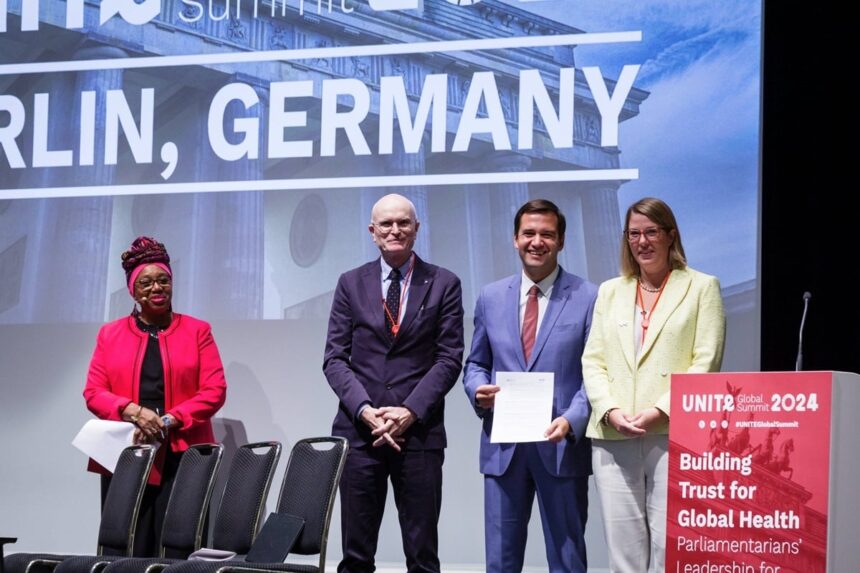Global Parliamentarians Unite for Pandemic Preparedness
In a significant gathering at the UNITE Global Summit in Berlin, parliamentarians from various nations came together to endorse a statement supporting the World Health Organization’s (WHO) Pandemic Agreement. This declaration, which received signatures from the President of UNITE and numerous global parliamentarians, signifies a robust commitment to enhancing pandemic readiness, response strategies, and equitable health access.
“As representatives of our constituents, parliamentarians play an essential role in protecting public health,” stated Ricardo Baptista Leite, President of UNITE. “The WHO Pandemic Agreement offers a pivotal chance to avert future pandemics while bolstering our collective preparedness and response capabilities. By endorsing this statement, we are not only expressing our support for this agreement but also committing ourselves to uphold its principles of equity and global cooperation across all nations.”
The Significance of the UNITE Global Summit
This year’s UNITE Global Summit was held in partnership with the World Health Summit (WHS), bringing together influential figures including global lawmakers, civil society leaders, and health specialists. The summit aims to transform discussions into actionable policy initiatives focusing on pressing health issues categorized under four primary pillars: Human Rights & Equitable Access to Health; Global Health Architecture & Security; Strengthening Healthcare Systems; and Sustainable Financing for Health. A key highlight was the signing of the Global Parliamentary Statement supporting the Pandemic Agreement—underscoring parliamentarians’ vital role in ensuring worldwide health security against future pandemics.
Aiming for Comprehensive Solutions
The WHO’s ongoing negotiations regarding the Pandemic Agreement seek to address vulnerabilities highlighted by COVID-19 as well as threats posed by diseases like mpox. The agreement aims at fostering international collaboration on pandemic prevention and response strategies. This parliamentary statement reflects lawmakers’ dedication to safeguarding their citizens by advocating that all countries—regardless of their economic status—have fair access to necessary healthcare resources during pandemics such as vaccines, treatments, medical supplies, and crucial healthcare information.
Support from WHO Leadership
The Director-General of WHO welcomed this strong parliamentary endorsement enthusiastically. “The WHO Pandemic Agreement represents an unprecedented opportunity for us to create a more robust and equitable global health system,” remarked Dr. Tedros Adhanom Ghebreyesus. “By signing this statement today, parliamentarians worldwide are demonstrating their commitment towards protecting lives against future pandemics while ensuring that vaccines and other essential healthcare tools are accessible globally—especially in resource-limited countries.”
Key Commitments Outlined by Parliamentarians
As advocates for their communities’ interests globally positioned within legislative frameworks can significantly influence both ratification processes post-agreement negotiation as well as its implementation thereafter.
- Equity at Its Core: Guaranteeing fair access based on public health needs during pandemics particularly prioritizing less-resourced nations.
- A Spirit of Solidarity: Enhancing international collaboration aimed at building resilient healthcare systems capable enough not just reactively but proactively preventing potential outbreaks.
- Pursuing Legislative Action: Promoting ratification efforts within national legislatures concerning provisions outlined within said agreement where applicable.
- Tackling Misinformation: Equipping communities with accurate evidence-based information counteracting harmful falsehoods surrounding public health matters.
Baptista Leite reiterated how imperative collective action is: “Today’s challenges necessitate unified responses; no single nation can tackle or prevent pandemics independently.” He emphasized that adopting measures through agreements like those proposed by WHO is critical so every country possesses adequate resources needed when facing imminent threats.”
The Path Forward: Building International Support
The success trajectory ahead relies heavily upon garnering widespread backing from governments alongside civil society organizations committed towards advancing these goals collectively recognizing that infectious diseases transcend borders necessitating solidarity among all peoples globally.
Furthermore emphasizing sustainable financing mechanisms research development initiatives capacity-building endeavors will be paramount enabling swift effective responses whenever crises arise!
This collaborative effort will see legislators working hand-in-hand with WHO along other international entities ensuring successful implementation benefiting every nation especially those facing resource constraints.
The signed declaration emerging out Berlin serves not merely symbolic gesture rather catalyst propelling further actions fostering unity amongst diverse nations!





